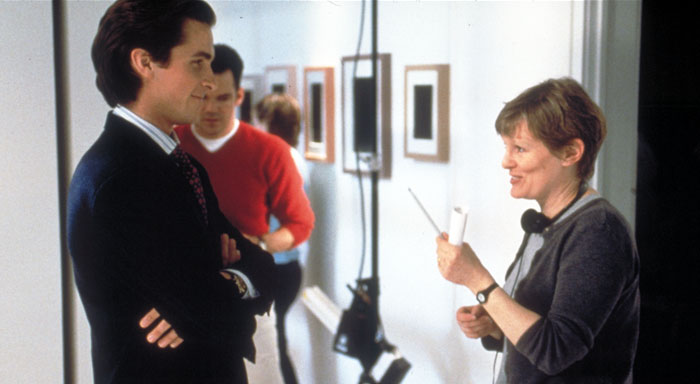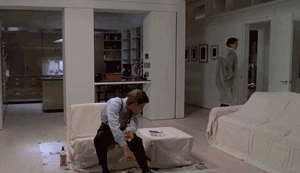Mary Harron
4. American Psycho, directed by
Mary Harron
American Psycho: Do All Psychopathic Murderers
Look That Celestial?
Given an R Rating for a reason, this film is based on the novel which was famously banned in several countries for its controversial and explicit content. In other countries, like Australia, the book was wrapped in a protective cover. Thankfully, much of the intensely graphic violence has been shed in this iteration.
American Psycho is both a disturbing and blackly humorous satire of – among other things – the power of Consumerism and Capitalism. Appropriately, it’s set in the late 1980s, where America’s booming Wall Street was a petri dish for greed and materialism. Everything revolves around appearances, from the designer suits to the restaurant reservations. The brokers are all interchangeable, without identity or worthwhile objectives, instead living a homogenous existence in order to ‘fit in’. Focused on money, possessions and physical appearance, the ‘American Dream’ transforms itself into an unquenchable monster, personified by Patrick Bateman. This central figure, played by Christian Bale, is a 27-year-old stock broker, although his time at work involves no real work: he spends most business hours arranging luxe business lunches.
Oh, and I suppose I forgot to mention that he’s a serial killer, although this is usually reserved for non-business hours. Or, at least, it is to begin with. Of course, the absurd style of this film lends itself to metaphorical comparisons, where deciphering what’s real and what’s allegorical remains questionable. What is certainly clear is that Bateman is a narcissist, misogynistic egomaniac, who describes his only human emotions as greed and disgust. In no way is he a hero, an underdog, or even an anti-hero, which on it’s own is pretty remarkable. Arguably no other film permits the central character to be so severely unlikable – irredeemable, in fact – and with no character transformation except a spiral into further lunacy.

Christian Bale is insanely impressive (sorry…) as Bateman. I think this role should have earned him an Oscar nomination, at the least. His mental erraticism and commitment is a master class in acting, and he nails the blank-eyed look of a man lacking a soul (Bateman’s words, not mine). Chloe Sevigny plays the ‘outsider’, a caring secretary who’s tragically drawn to Bateman (understandable, because he physically represents a demigod, and unfortunate, because he is an actual psycho). Bateman isn’t ignorant of his jaw-dropping looks either: vanity is all pervasive with the motif of mirrors, to which Bateman is constantly drawn as he seeks physical validation. Much of his time is consumed by superficial pursuits including a detailed skincare regime and a rigorous exercise routine.
In my eyes, the fact that most of the violence is off-screen speaks to the perceptiveness of a female director: rather than dwelling on the confronting act of violence itself, the audience instead fears it, while it lurks threateningly around every corner. The mood then becomes tense and full of dread, with the action illuminating the consequences and aftermaths of violence. Harron chooses to play with the absurdist tone further through softening the violence with cartoon-like effects, such as bright, cherry-red blood.

It’s a film that’s deeply layered in its critique of societal pressures and the insubstantial nature of materialistic values. Particularly in this day and age, it also speaks powerfully about how the elite VIP’s of the world can do anything and get away with it.
Note: Check out Christian Bale’s moonwalk in the terrific scene with Jared Leto. It was improvised. Genius.
